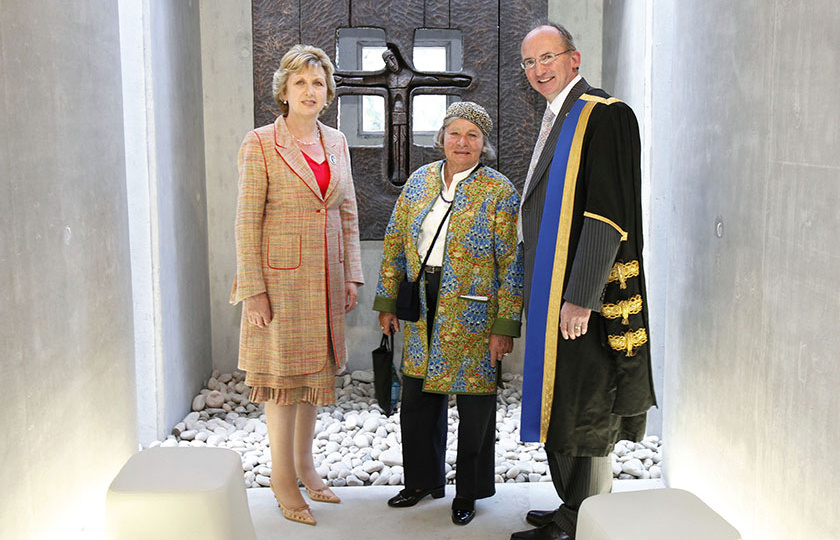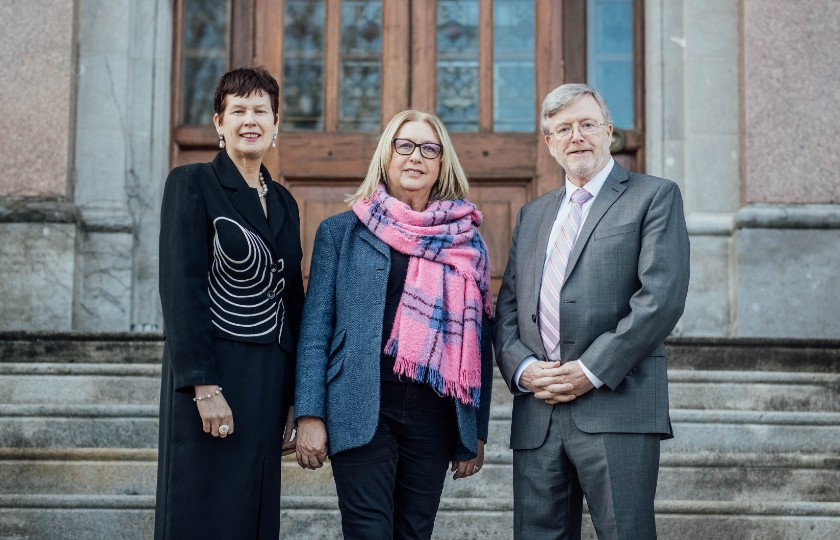
President Mary McAleese (centre) pictured with Dr Patricia Kieran, Director of the Irish Institute for Catholic Studies and Professor Eugene Wall, President of MIC.
Former President of Ireland, Mary McAleese, has opened up about her faith and hopes for the future of the Catholic Church at a special event at Mary Immaculate College. President McAleese was discussing ‘On Being A Catholic’ at the invitation of the Irish Institute for Catholic Studies (IICS) at MIC in front of an audience made up of the College’s students, staff and community.
In a detailed and wide-ranging two-hour conversation with Dr Patricia Kieran, Director of the IICS, President McAleese spoke about her upbringing in a Catholic family in a Protestant neighbourhood in Belfast, her perception of the Church in her formative years, her work as a lawyer, and her renewed focus on Catholicism since leaving Áras an Uachtaráin in 2011, among other topics.
Dr Kieran thanked the President for her contemplative and honest reflection on her life and religion, and said: “It has been a huge privilege for us to be in your company and to hear your passion, integrity, honesty, openness and your connection with people. It’s wonderful to hear you articulate - with that critical, intelligent, expert voice - your thoughts on Catholicism, on canon law, on various pastoral issues, and to share so generously with us.”
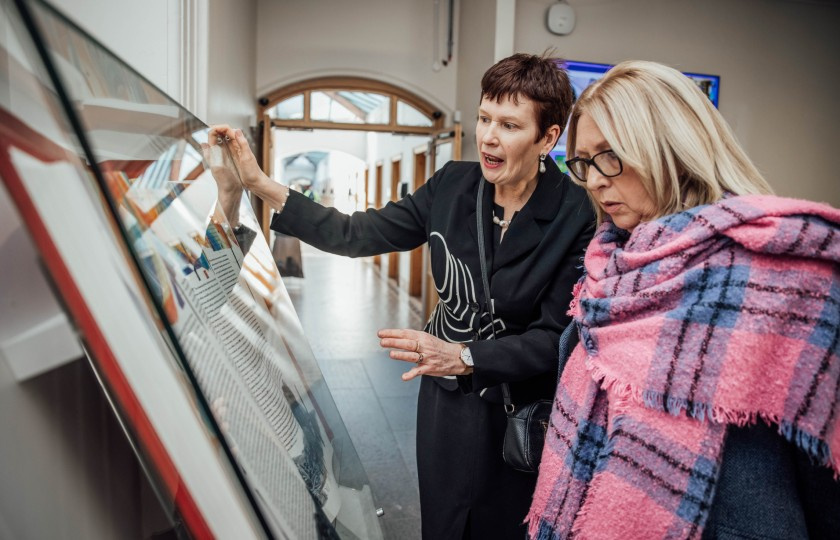
Speaking of her reflection of Catholicism and her own faith, President McAleese identified a number of issues she hopes to see improved including the power imbalance in the church, the exclusion of women from church roles and the treatment of the LGBTQI+ community.
“I’ve read everything that has been written on theology that excludes women and I’ve read nothing yet that is impressive,” said President McAleese. “It’s the kind of theology that is custom raised to meet the Magisterium teaching and to flatter it but not to integrate it, and I think that’s a pity. The important thing about excluding women from priesthood is you also exclude them ipso facto from decision making because all decision making in the church is written through the Magisterium.”
“There are a few women in the aerial roles and I don’t want to be mean about this but it just strikes me as minimalism. It’s just enough to stop people from whinging and complaining and to look like you’re doing something. But what you’re doing is never really addressing the fundamental inequalities and the fundamental waste of talent.
“I think the church has to change and the governance structure has to change. The hierarchical construct belongs to an old empire. It’s no longer fit for purpose and I think it will have to change.”
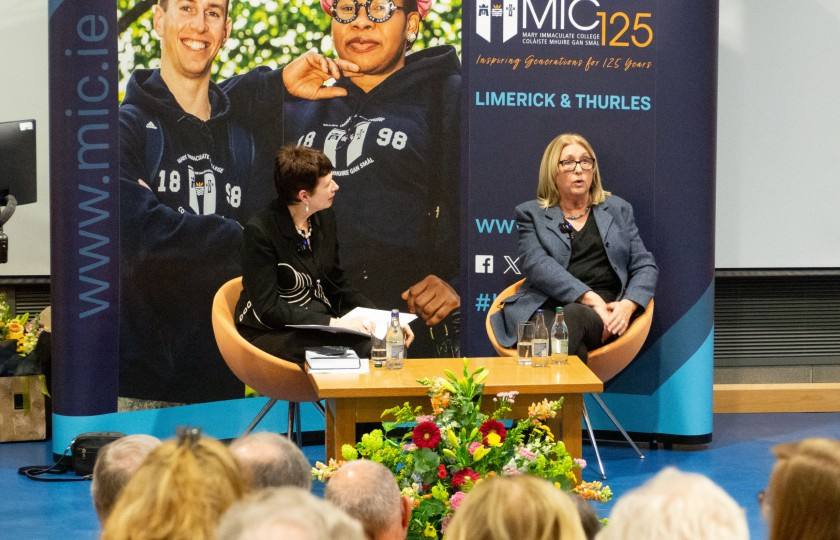
President McAleese referred to “a synodal process that truly involves the laity” as something she would approve of.
“I would love to see something like what’s happened in Germany… We’ve had synodal processes in Ireland but at the end of the day the filtering is always filtered through the Episcopal conference. That’s not to say the Episcopal conference got anything wrong, I actually think our Episcopal conference did quite a good job on the Synodal synthesis. But what we don’t have is, if you like, a stable forum in which our bishops meet the people of God on the basis of equality. Our Episcopal conference, if it meets laypeople, they are brought in as invited guests or experts. I just don’t think it’s the right fit.
“I like the German Synodal set up in which the laity and the bishops are in a regular, stable, fixed dialog and also have a kind of solidarity now between bishops and people that I don’t see anywhere else. I think our bishops have had a massive problem because of the clerical abuse and trust being shattered. Of course, the same thing happened in Germany also but as an antidote to that they are sort of building from the grassroots up to this model of synodality in which there is equality between laity and episcopacy and clerics. And I like that it’s not perfect. At the end of the day, due to the way its structured at the moment, the decision still ends up being filtered through the numbers of bishops, they have to have a majority. But it’s on the way to something new.”
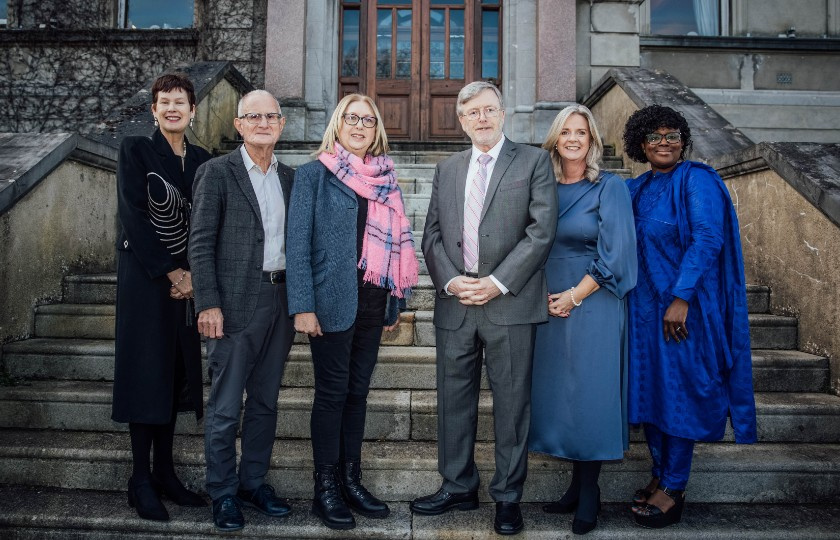
It is the first official visit to MIC by the former President since leaving office in 2011. In 2010, President McAleese presented the McAuley Medal to Imogen Stuart RHA, in recognition of her lifetime contribution to the arts in Ireland. Additionally, President McAleese launched Passing The Torch, a book published by former President of MIC, Sr Loreto O’Connor, in 1998 to celebrate and chart a century since the foundation of the College.
